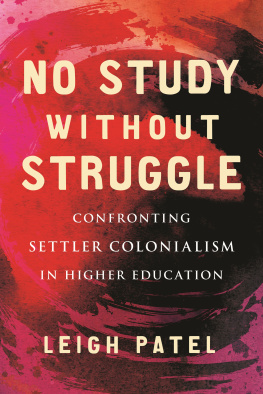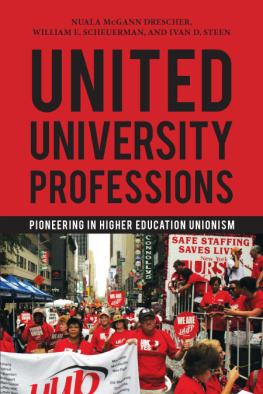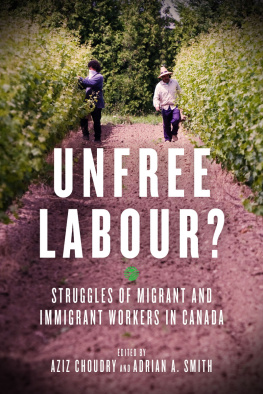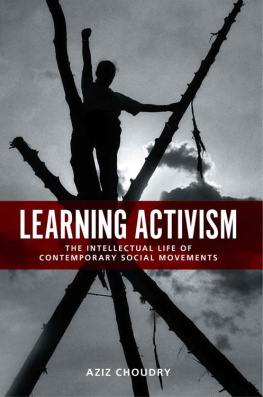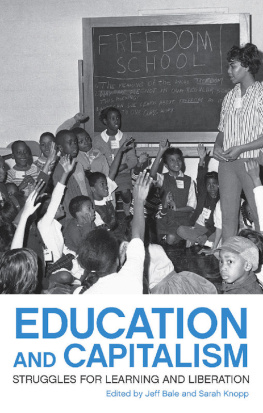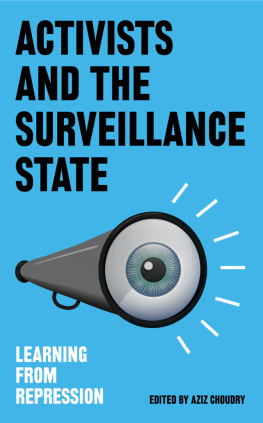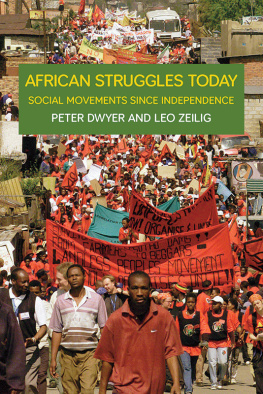The University and Social Justice
The University and
Social Justice
Struggles Across the Globe
Edited by Aziz Choudry and Salim Vally
First published 2020 by Pluto Press
345 Archway Road, London N6 5AA
www.plutobooks.com
Copyright Aziz Choudry and Salim Vally 2020
The right of the individual contributors to be identified as the authors of this work has been asserted by them in accordance with the Copyright, Designs and Patents Act 1988.
British Library Cataloguing in Publication Data
A catalogue record for this book is available from the British Library
ISBN 978 0 7453 4067 8 Hardback
ISBN 978 0 7453 4068 5 Paperback
ISBN 978 1 7868 0574 4 PDF eBook
ISBN 978 1 7868 0576 8 Kindle eBook
ISBN 978 1 7868 0575 1 EPUB eBook
This book is printed on paper suitable for recycling and made from fully managed and sustained forest sources. Logging, pulping and manufacturing processes are expected to conform to the environmental standards of the country of origin.
Typeset by Swales & Willis
Simultaneously printed in the United Kingdom and United States of America
Contents
List of figures and tables
FIGURES
TABLES
Acknowledgements
As researchers and educators working in universities in Montreal and Johannesburg, we are greatly inspired by and have supported and participated in struggles of student activists and movements, academic and non-academic workers, campus action groups and campaigns. These organisations have not only fought for accessible, critical and quality public education, acted against the interests of political and economic elites, and also advocated for broader progressive change and radical visions for a fairer world. After Qubecs 2012 printemps rable (Maple Spring), and as Rhodes Must Fall/Fees Must Fall spread across South Africa, it seemed inevitable that we would work on a collection like this one.
This book examines university-based activism and its relationship with wider social and political change. Besides the accounts of the politics of resistance from within higher education, in the context of multiple crises of capitalism, ecology, xenophobia and fascism, many more are urgently needed. We dedicate this book to these collective struggles past, present and future.
Our deepest gratitude goes to all of the contributors to this collection for their time, energy and generosity of spirit in completing their chapters, sometimes under adverse conditions. We greatly appreciate David Shulman, Neda Tehrani and the team at Pluto Press for their enthusiastic support, as well as the reviewers of the original book proposal for their helpful suggestions. Many thanks are due to Dsire Rochat who assisted us in preparing and formatting the book manuscript with professionalism, a critical eye, patience and good humour. We thank Melanie Marshall, Adam Bell and Swales and Willis for their invaluable help with the final pre-production stages. We also acknowledge support from Azizs Canada Research Chair in social movement learning and knowledge production.
While completing this book, we lost Mudney Halim (Johannesburg) and Vicky Pearson (Montreal), both long-time educators and social justice activists. All royalties from this book will be donated to the Centre for Education Rights and Transformation at the University of Johannesburg.
Lessons in struggle, studies in resistance
Aziz Choudry and Salim Vally
While the commodification of education and the spectre of the corporate university (private and public) haunts, and has indeed materialised in many locations, many campuses remain sites of struggle, whether erupting, dormant or under the radar. Over 50 years have passed since the 1968 wave of rebellion reverberated around the world against authoritarian rule, war and colonialism when students, often alongside workers, organised mass protests, sending shockwaves of alarm among political, economic and military elites (Dubinsky, Krull, Lord, Mills & Rutherford, 2009; de Garca, 2005; Pensado, 2015; Vrana, 2017). Throughout the 1950s, 1960s and 1970s and since in Thailand, Pakistan, South Korea, Iran and other parts of Asia, Latin America, Africa, Europe and the Pacific, campuses have frequently erupted in protest.
At the start of the twenty-first century, struggles within higher education continue in the context of deep social and economic inequalities, global ecological and capitalist crises, multiple forms of state violence and repression, demands for rethinking the framework and purpose of formal education and universal access to free quality education (on recent student movements, see, for example, Brooks, 2017; Ferguson, 2017; Hensby, 2018; Myers, 2017; Solomon & Palmieri, 2011; Weiss & Aspinall, 2012; Zamponi, 2018). Demands for institutional change, and calls to decolonise (however this term is defined) institutions, programmes of study and curricula have spread across campuses and countries (Bhambra, Gebrial & Niancolu, 2018; Rhodes Must Fall Oxford, 2018; Sian, 2019). As labour precarity bites deeply across sectors and societies, in many countries, university workers academic and non-academic and students have organised to resist further cuts to education and social spending, the imposition of neoliberal governance models, reorientation of education along market lines and the suppression of dissent. In some instances, students have also supported staff in universities struggling for a living wage and opposed the practice of outsourcing workers. In many countries, students, academic and non-academic staff have organised against military research on campus, formed an anti-sweatshop movement against apparel manufacturers, opposed university investments in fossil fuels, mining and other environmentally destructive businesses and demanded institutional/structural changes to address sexism, racism and economic marginalisation (see Chatterjee & Maira, 2014).
Some of these struggles draw on or implicitly continue longer histories and traditions of popular resistance and have been connected to broader movements for progressive social, political and economic change and radical visions of a fairer world. But while intergenerational knowledge may be sometimes passed on within organisations, movements and activist networks, this does not always happen. Among other reasons, the transitory nature of student life at universities poses challenges to recovering useable histories of earlier struggles. As well as a critical geohistorical lens which attends to specific histories, contexts and politics, we believe that these movements need to be theorised within the context of wider understandings of contemporary capitalism and authoritarianism and their potentials explored.
In recent years, from RhodesMustFall/FeesMustFall in South Africa to the Maple Spring in Qubec, from Chile to Palestine, student demands, and those of teaching faculty and non-academic workers have sometimes connected to broader struggles for social, economic and political justice and indeed wider politics of peoples movements for liberation, and against authoritarianism, austerity and fascism. In many cases, student movements have met with violent police and state security responses. But they have also sometimes made significant gains. As we write, across the globe, students and professors are again being targeted by the state and right-wing political activists, criminalised, vilified, jailed and assaulted for speaking out against violence, injustice, fascism and repression.
From Palestine to Puerto Rico (Martinez & Garcia, 2018), some student/education justice movements still play important roles in resisting occupation and colonial rule, as in earlier periods. For example, Walker (1990) notes the role of Nga Tamatoa, which emerged from Maori students at the University of Auckland in the 1970s in the Maori movement for self-determination in Aotearoa/New Zealand, in successfully pressuring the New Zealand government for Maori language to be taught in schools. As with other movements, student movements also have their own internal contradictions. Important examples of this are feminist challenges about ways in which dominant forms of gender relations and sexual violence can be reproduced within these movements, as well as anti-racist challenges to student politics and higher education (see for example, hampton, Campos-Martnez and Olavarra, and Abdulhadi and Shehadeh chapters in this volume), including challenging the ways in which decisions are made during student struggles and relations with political parties.



